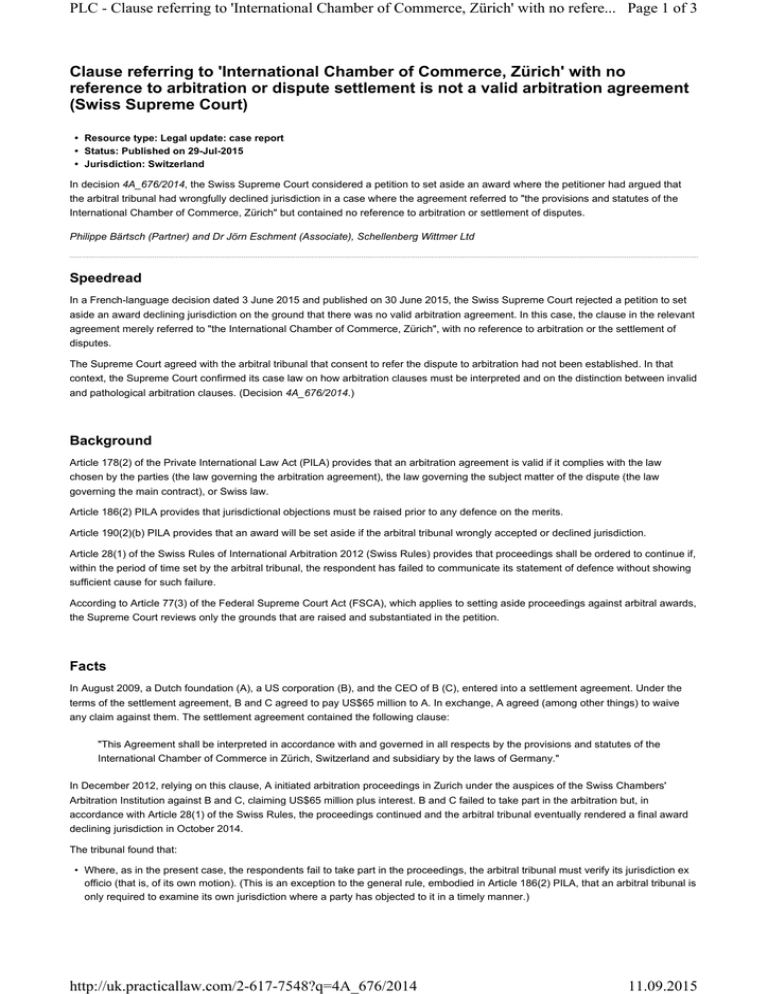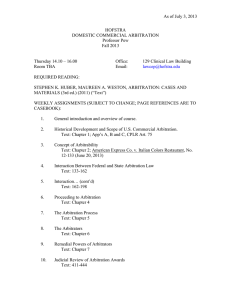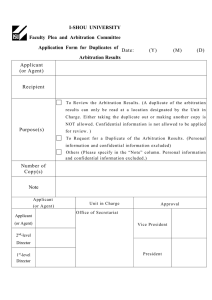
PLC - Clause referring to 'International Chamber of Commerce, Zürich' with no refere... Page 1 of 3
Clause referring to 'International Chamber of Commerce, Zürich' with no
reference to arbitration or dispute settlement is not a valid arbitration agreement
(Swiss Supreme Court)
• Resource type: Legal update: case report
• Status: Published on 29-Jul-2015
• Jurisdiction: Switzerland
In decision 4A_676/2014, the Swiss Supreme Court considered a petition to set aside an award where the petitioner had argued that
the arbitral tribunal had wrongfully declined jurisdiction in a case where the agreement referred to "the provisions and statutes of the
International Chamber of Commerce, Zürich" but contained no reference to arbitration or settlement of disputes.
Philippe Bärtsch (Partner) and Dr Jörn Eschment (Associate), Schellenberg Wittmer Ltd
Speedread
In a French-language decision dated 3 June 2015 and published on 30 June 2015, the Swiss Supreme Court rejected a petition to set
aside an award declining jurisdiction on the ground that there was no valid arbitration agreement. In this case, the clause in the relevant
agreement merely referred to "the International Chamber of Commerce, Zürich", with no reference to arbitration or the settlement of
disputes.
The Supreme Court agreed with the arbitral tribunal that consent to refer the dispute to arbitration had not been established. In that
context, the Supreme Court confirmed its case law on how arbitration clauses must be interpreted and on the distinction between invalid
and pathological arbitration clauses. (Decision 4A_676/2014.)
Background
Article 178(2) of the Private International Law Act (PILA) provides that an arbitration agreement is valid if it complies with the law
chosen by the parties (the law governing the arbitration agreement), the law governing the subject matter of the dispute (the law
governing the main contract), or Swiss law.
Article 186(2) PILA provides that jurisdictional objections must be raised prior to any defence on the merits.
Article 190(2)(b) PILA provides that an award will be set aside if the arbitral tribunal wrongly accepted or declined jurisdiction.
Article 28(1) of the Swiss Rules of International Arbitration 2012 (Swiss Rules) provides that proceedings shall be ordered to continue if,
within the period of time set by the arbitral tribunal, the respondent has failed to communicate its statement of defence without showing
sufficient cause for such failure.
According to Article 77(3) of the Federal Supreme Court Act (FSCA), which applies to setting aside proceedings against arbitral awards,
the Supreme Court reviews only the grounds that are raised and substantiated in the petition.
Facts
In August 2009, a Dutch foundation (A), a US corporation (B), and the CEO of B (C), entered into a settlement agreement. Under the
terms of the settlement agreement, B and C agreed to pay US$65 million to A. In exchange, A agreed (among other things) to waive
any claim against them. The settlement agreement contained the following clause:
"This Agreement shall be interpreted in accordance with and governed in all respects by the provisions and statutes of the
International Chamber of Commerce in Zürich, Switzerland and subsidiary by the laws of Germany."
In December 2012, relying on this clause, A initiated arbitration proceedings in Zurich under the auspices of the Swiss Chambers'
Arbitration Institution against B and C, claiming US$65 million plus interest. B and C failed to take part in the arbitration but, in
accordance with Article 28(1) of the Swiss Rules, the proceedings continued and the arbitral tribunal eventually rendered a final award
declining jurisdiction in October 2014.
The tribunal found that:
• Where, as in the present case, the respondents fail to take part in the proceedings, the arbitral tribunal must verify its jurisdiction ex
officio (that is, of its own motion). (This is an exception to the general rule, embodied in Article 186(2) PILA, that an arbitral tribunal is
only required to examine its own jurisdiction where a party has objected to it in a timely manner.)
http://uk.practicallaw.com/2-617-7548?q=4A_676/2014
11.09.2015
PLC - Clause referring to 'International Chamber of Commerce, Zürich' with no refere... Page 2 of 3
• As the parties did not agree on a law to govern the arbitration agreement, pursuant to Article 178(2) PILA, the substantive validity of
the arbitration agreement must be examined under either German law (the law said to govern the subject matter of the dispute) or
Swiss law.
• Under Swiss law, there was no true and common intent to arbitrate and, based on the wording of the clause, a reasonable party
would likely read it as a choice-of-law clause addressing the applicable law only. The arbitral tribunal reached a similar conclusion
under German law.
In November 2014, A filed a petition to set aside the award, arguing that the arbitral tribunal had wrongly declined jurisdiction. B and C
did not participate in the setting aside proceedings.
Decision
The Supreme Court rejected the petition, fully upholding the arbitral tribunal's reasoning.
As a preliminary matter, the Supreme Court observed that A had, in its petition, not objected to the arbitral tribunal's interpretation and
application of German law. Applying Article 77(3) FSCA, it therefore only reviewed whether the arbitral tribunal had wrongfully applied
Swiss law when declining jurisdiction.
The Supreme Court summarised its case law on the validity of arbitration agreements. Under Swiss law, to ascertain whether the
parties have validly agreed to submit their dispute to arbitration, one must first search for their true and common intent. If that cannot be
established, the parties' declarations will be construed pursuant to the principle of good faith (that is, as they would be understood by a
reasonable person in the same circumstances). In that context, the Supreme Court emphasised that arbitration clauses that are unclear,
incomplete or contradictory (so-called pathological arbitration clauses), are not necessarily invalid, provided that the pathological
elements do not affect the core requirements for a valid arbitration clause, in particular the agreement of the parties to submit the
dispute to arbitration.
Therefore, if it can be established that the parties did in fact intend to submit their dispute to arbitration, a pathological arbitration clause
must be construed (or even amended based on the hypothetical will of the parties) according to general rules of contract law, to try and
find a solution that does justice to the parties' intent to submit their dispute to arbitration.
No true and common intent to arbitrate
The Supreme Court first noted that the arbitral tribunal had found, based on the evidence on record, that the petitioner had failed to
establish the parties' intent to exclude the state courts' jurisdiction and submit the dispute to arbitration. Noting that this finding regarding
the parties' intent was a finding of fact, which was outside the scope of its review, the Supreme Court rejected A's attempt to rely on a
different reading of the evidence in support of its challenge. It also rejected A's argument that a reduced burden of proof should apply
because B and C had failed to take part in the proceedings.
No intent to arbitrate based on an objective interpretation
The Supreme Court then reviewed the arbitral tribunal's objective interpretation of the clause relied on by the petitioner and upheld the
finding that there was no valid arbitration agreement. In that context, it noted that the use of standard terms commonly found in
arbitration clauses (such as "arbitration", "arbitral tribunal" or "arbitration clause") was not necessarily decisive to ascertain whether the
parties agreed to submit the dispute to arbitration. However, the lack of any reference whatsoever to a "dispute" to be settled was
significant.
Furthermore, the clause only referred to the interpretation of the settlement agreement and the applicable rules of law. According to the
Supreme Court, the mere fact that it referred to "the International Chamber of Commerce in Zürich" was not sufficient to conclude that it
was an arbitration agreement, as it was not established that the parties knew that arbitration was one of the numerous services offered
by this institution. In fact, given that the clause established a link between the provisions and statutes of the International Chamber of
Commerce in Zürich and the subsidiary application of the laws of Germany, the disputed clause could be deemed a choice-of-law
clause, even if that meant that the parties erroneously believed the "provisions and statutes of the International Chamber of Commerce
in Zürich" to be substantive rules of law.
The Supreme Court concluded that the disputed clause was not only pathological, in that it did not designate the institution (that is, the
Chamber of Commerce of Zurich or ICC with seat in Zurich) with sufficient precision, but more importantly it did not constitute an
arbitration agreement because it could not be established that the parties agreed to refer their disputes to arbitration.
Comment
http://uk.practicallaw.com/2-617-7548?q=4A_676/2014
11.09.2015
PLC - Clause referring to 'International Chamber of Commerce, Zürich' with no refere... Page 3 of 3
The decision confirms the Supreme Court's established case law that, under Swiss law, pathological arbitration clauses are not per se
invalid, as long as the parties' intent to arbitrate is clear. Rather, pathological clauses must be interpreted and, as the case may be,
supplemented in accordance with general rules of contract law. The decision also gives some helpful guidance as to when the Supreme
Court will consider that an arbitration clause is invalid or merely pathological – an important distinction.
The conclusion reached by the Supreme Court that the disputed clause was not an arbitration clause seems correct given the unclear
wording used by the parties. This case confirms the importance of drafting clear and unambiguous arbitration clauses.
Case
4A_676/2014 ( www.practicallaw.com/D-033-8601) ((Swiss Supreme Court).
Resource information
Resource ID: 2-617-7548
Published: 29-Jul-2015
Products: Arbitration (All jurisdictions), PLC Arbitration Email, PLC US Law Department
Related content
Topics
Arbitral Awards and Challenges (http://uk.practicallaw.com/topic0-203-6785)
Arbitration Agreements (http://uk.practicallaw.com/topic5-203-6783)
Practice note: overview
International arbitration clauses toolkit (http://uk.practicallaw.comtopic2-381-9704)
Practice notes
Arbitration in Switzerland (http://uk.practicallaw.comtopic9-513-8272)
Drafting international arbitration agreements: an overview (http://uk.practicallaw.comtopic2-203-8670)
Enforcing arbitration awards in Switzerland (http://uk.practicallaw.comtopic1-573-3968)
What's wrong with my arbitration clause? (http://uk.practicallaw.comtopic2-500-1809)
Standard clause
Switzerland: ad hoc arbitration clause (http://uk.practicallaw.comtopic6-521-7299)
Country Q&A
Arbitration procedures and practice in Switzerland: overview (http://uk.practicallaw.comtopic5-502-1047)
Litigation and enforcement in Switzerland: overview (http://uk.practicallaw.comtopic1-502-1695)
Case page
Decision 4A_676/2014 (http://uk.practicallaw.comtopicD-033-8601)
©2015 Thomson Reuters. All rights reserved. Privacy Policy and Cookies(http://www.practicallaw.com/3-386-5597).Legal Information
(http://www.practicallaw.com/8-531-0965). Subscription enquiries +44 (0)20 7202 1220 or email subscriptions@practicallaw.com. The reference after
links to resources on our site (e.g. 2-123-4567) is to the PLC Reference ID. This will include any PDF or Word versions of articles.
http://uk.practicallaw.com/2-617-7548?q=4A_676/2014
11.09.2015




